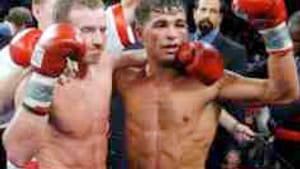Stay in the Loop
BSR publishes on a weekly schedule, with an email newsletter every Wednesday and Thursday morning. There’s no paywall, and subscribing is always free.
Requiem for a welterweight
Punch-drunk in Hollywood: 'The Fighter'

The punch-drunk boxing movie, with its crowd-pleasing combination of conflict and action, is an old and all too familiar Hollywood standby. Its standard bearer, for better or worse, was the original Rocky of 1975, which took every existent boxing cliché, added a few new ones, and won Sylvester Stallone a bunch of Oscars and a ticket to the Boxing Hall of Fame.
The Boxing Hall of Fame is actually run by the former middleweight Carmen Basilio, who embodied the grit, dedication and talent that make up a genuine champion. The junior welterweight "Irish" Micky Ward, whose story The Fighter purportedly tells, was such a boxer, and his tale is certainly worth telling.
Ward's three Atlantic City fights with the late Arturo "Thunder" Gatti in 2002 and 2003 were breathtaking in their savagery as well as the levels of courage, both physical and mental, displayed by both men. The punishment given and absorbed was unending and truly horrific, even to blooded veterans of the fight game. These fights"“ two won by Gatti, one by Ward— were doubtless the pinnacles of both combatant's careers and lives, for that matter. They became close friends as a result until Gatti's untimely death in Brazil in 2009, still a muddled, unsolved homicide or suicide.
Yet these landmark battles are virtually omitted from The Fighter, which mentions them only at the film's end in a brief onscreen text message. This is like making a film about Napoleon without Waterloo, or MacArthur without his return to the Philippines, or Roosevelt without Pearl Harbor.
Upstaged by his brother
Instead, The Fighter's focus is basically split between Ward and his wayward half-brother, Dicky Eklund, a truly over-the-top crackhead played with over-the-top brio by the magnificent Christian Bale, easily among the finest film actors of his generation. In one sense, Eklund is more interesting than Ward, and director David O. Russell and his writing crew have been seduced both by Eklund and Bale's hyper, dope-fiend-skeletal portrayal of him, with the result that Micky Ward, played by an almost somnambulant Mark Wahlberg, is a co-equal at best in his own film.
The real Micky Ward is a chirpy, jokey, very self-aware man, but Wahlberg plays him as a barely articulate second cousin to Marlon Brando's immortal Terry Malloy in On the Waterfront. Micky's truly worthy story becomes diluted to the point of well-worn cliché, serving up the predictable combination of last-minute knockouts, a stand-up girlfriend and, in the end, a championship (albeit a second-tier one).
Puppy-dog effect
But that is the nature of this kind of boxing movie. There is what I call a "puppy dog" effect in play here. With The Wrestler, Mickey Rourke's character, as well as Rourke himself, became a good-guy cliché that audiences and critics could pat on the head condescendingly like a pet puppy and feel good about themselves. So it is with The Fighter, a well-orchestrated skim over the deeper realities of the fight game, which is definitely not a game. Nobody "plays" boxing.
Like Rocky and so many other fight films before it, The Fighter is finally a boxing movie for the general public, which mainly likes its endings happy and its heroes heroic.
Yet film legends like John Huston and Martin Scorsese have made boxing films that moved beyond the cartoon world of film fisticuffs into the fight game as it really is. Perhaps the two best boxing movies ever made are Scorsese's Raging Bull (1980), with Robert DeNiro as Jake LaMotta, and Huston's vastly under-appreciated Fat City (1972), from Leonard Gardner's masterful novel of the same name, starring Stacey Keach and the beautiful young Jeff Bridges as two club fighters stumbling through the bars and fight clubs of Stockton in California's Central Valley in the 1960s.
Harpies in blue jeans
Yet The Fighter contains its share of bright cinematic moments. Bale's performance is certainly one, as is Melissa Leo's portrayal of Ward's hard case mother-manager, who recently died. Leo exudes the streets and attitude of blue collar Lowell, Mass., in her every gesture and utterance. Hers is a small, perfect, commanding performance, much more so than Amy Adams's more widely acclaimed role as Micky Ward's girlfriend, Charlene.
And Micky's seven beer-guzzling, chain-smoking, foul-mouthed sisters "“ harpies in blue jeans— are a low-rent joy to behold. They'd be right at home in Fishtown, bless them. Or in the ring, with Micky.♦
To read responses, click here.
The Boxing Hall of Fame is actually run by the former middleweight Carmen Basilio, who embodied the grit, dedication and talent that make up a genuine champion. The junior welterweight "Irish" Micky Ward, whose story The Fighter purportedly tells, was such a boxer, and his tale is certainly worth telling.
Ward's three Atlantic City fights with the late Arturo "Thunder" Gatti in 2002 and 2003 were breathtaking in their savagery as well as the levels of courage, both physical and mental, displayed by both men. The punishment given and absorbed was unending and truly horrific, even to blooded veterans of the fight game. These fights"“ two won by Gatti, one by Ward— were doubtless the pinnacles of both combatant's careers and lives, for that matter. They became close friends as a result until Gatti's untimely death in Brazil in 2009, still a muddled, unsolved homicide or suicide.
Yet these landmark battles are virtually omitted from The Fighter, which mentions them only at the film's end in a brief onscreen text message. This is like making a film about Napoleon without Waterloo, or MacArthur without his return to the Philippines, or Roosevelt without Pearl Harbor.
Upstaged by his brother
Instead, The Fighter's focus is basically split between Ward and his wayward half-brother, Dicky Eklund, a truly over-the-top crackhead played with over-the-top brio by the magnificent Christian Bale, easily among the finest film actors of his generation. In one sense, Eklund is more interesting than Ward, and director David O. Russell and his writing crew have been seduced both by Eklund and Bale's hyper, dope-fiend-skeletal portrayal of him, with the result that Micky Ward, played by an almost somnambulant Mark Wahlberg, is a co-equal at best in his own film.
The real Micky Ward is a chirpy, jokey, very self-aware man, but Wahlberg plays him as a barely articulate second cousin to Marlon Brando's immortal Terry Malloy in On the Waterfront. Micky's truly worthy story becomes diluted to the point of well-worn cliché, serving up the predictable combination of last-minute knockouts, a stand-up girlfriend and, in the end, a championship (albeit a second-tier one).
Puppy-dog effect
But that is the nature of this kind of boxing movie. There is what I call a "puppy dog" effect in play here. With The Wrestler, Mickey Rourke's character, as well as Rourke himself, became a good-guy cliché that audiences and critics could pat on the head condescendingly like a pet puppy and feel good about themselves. So it is with The Fighter, a well-orchestrated skim over the deeper realities of the fight game, which is definitely not a game. Nobody "plays" boxing.
Like Rocky and so many other fight films before it, The Fighter is finally a boxing movie for the general public, which mainly likes its endings happy and its heroes heroic.
Yet film legends like John Huston and Martin Scorsese have made boxing films that moved beyond the cartoon world of film fisticuffs into the fight game as it really is. Perhaps the two best boxing movies ever made are Scorsese's Raging Bull (1980), with Robert DeNiro as Jake LaMotta, and Huston's vastly under-appreciated Fat City (1972), from Leonard Gardner's masterful novel of the same name, starring Stacey Keach and the beautiful young Jeff Bridges as two club fighters stumbling through the bars and fight clubs of Stockton in California's Central Valley in the 1960s.
Harpies in blue jeans
Yet The Fighter contains its share of bright cinematic moments. Bale's performance is certainly one, as is Melissa Leo's portrayal of Ward's hard case mother-manager, who recently died. Leo exudes the streets and attitude of blue collar Lowell, Mass., in her every gesture and utterance. Hers is a small, perfect, commanding performance, much more so than Amy Adams's more widely acclaimed role as Micky Ward's girlfriend, Charlene.
And Micky's seven beer-guzzling, chain-smoking, foul-mouthed sisters "“ harpies in blue jeans— are a low-rent joy to behold. They'd be right at home in Fishtown, bless them. Or in the ring, with Micky.♦
To read responses, click here.
What, When, Where
The Fighter. A film directed by David O. Russell. For theaters and times in the Philadelphia area, click here.
Sign up for our newsletter
All of the week's new articles, all in one place. Sign up for the free weekly BSR newsletters, and don't miss a conversation.

 Bob Ingram
Bob Ingram